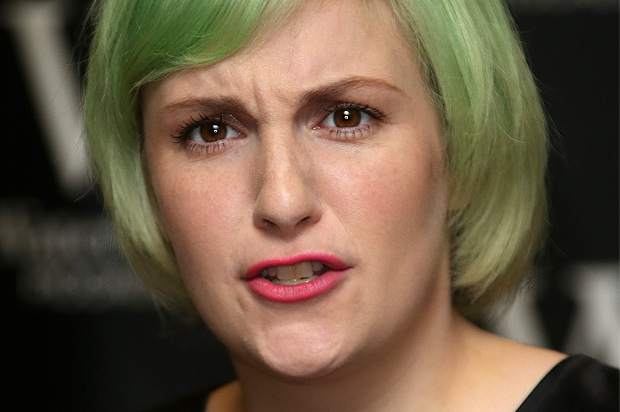Lena Dunham wasn’t exactly a stranger to controversy before this week. But after the Internet got wind of a particular passage in her memoir, she came under full fire for writing about childhood incidents that some claim toe the line of sexual abuse of her younger sister. The anecdote is an overshare of epic proportion, as is Dunham’s custom. There’s a particular brand of outraged approval that Dunham often seems to be seeking: she wants a strong, loud reaction to her work, but she wants to control the specific shape of it. Perhaps the most surprising thing about the backlash to Dunham’s book has been how shocked she seems that a passage designed to be provocative has stirred up a hornet’s nest of rage.
At first glance, the original headline on the right-wing site Truth Revolt appeared to be a sensationalized, tabloid trump-up (“Lena Dunham Describes Sexually Abusing Her Little Sister”), but the excerpt they published from “Not That Kind of Girl” went viral, and the Internet lashed out, and kept lashing out. When a door like this is opened on a lightning rod like Dunham, the anger comes hard and swift.
The emotional universe surrounding Dunham is unusually complex and diverse. Perhaps on this subject alone, the wingnuts stand united with their despised social justice warriors, embracing the hashtag #DropDunham to urge HBO to cancel “Girls.”
The criticism has come from all sides: Lena Dunham is a pedophile. Lena Dunham is the problem with mainstream feminism. Lena Dunham is what’s wrong with the liberal media. The rhetorical questions lobbed online reveal a strong streak of anxiety rooted deeper than Dunham: What if a gay man told the same story? Or a writer of color? What about her sister, don’t you care about victims? That those anxieties in general are frequently justified lends a certain sideways credence to these specific accusations against Dunham, which helps sustain the outrage. Dunham isn’t just the disease, according to this scandal. She’s also the symptom.
And every time Dunham steps forward unprompted to try to shout down or appease her critics, she just adds fuel to the fire. First, her “rage spiral” tweets, in which she called the accusations “really fucking upsetting and disgusting,” claiming that she “told a story about being a weird 7 year old” and urged her accusers to “back the fuck up bros.” Then, legal action: Truth Revolt reported that they received a cease and desist letter from Dunham’s camp. Now, she’s canceled book tour stops in Germany and Belgium. And today, she switched gears, ditching rage and avoidance for a formal apology in Time:
I am dismayed over the recent interpretation of events described in my book Not That Kind of Girl. First and foremost, I want to be very clear that I do not condone any kind of abuse under any circumstances. Childhood sexual abuse is a life-shattering event for so many, and I have been vocal about the rights of survivors. If the situations described in my book have been painful or triggering for people to read, I am sorry, as that was never my intention. I am also aware that the comic use of the term “sexual predator” was insensitive, and I’m sorry for that as well. As for my sibling, Grace, she is my best friend, and anything I have written about her has been published with her approval.
It’s a carefully worded statement. At this point, whether or not it’s genuine, it’s unlikely to change minds. Despite having many defenders, including her sister, a “Those Kinds of Girls” Tumblr, and child development experts who say what she described isn’t sexual abuse, angry people aren’t waiting to hear from Dunham to decide how they should feel about this.
When a writer puts a story out there, she gives up control of how it will be read and responded to — and this is especially true for a human Rorschach test like Dunham, who has built a career in part on artfully, unabashedly courting controversy. But maybe Dunham has learned a lesson here: attempting to manage Internet outrage only fans the flames.

